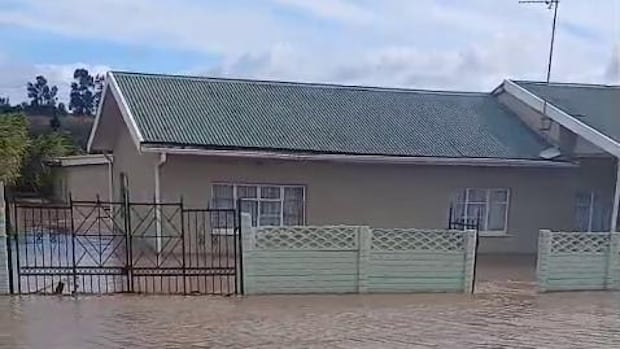As It Happens6:30South African woman describes watching rising floodwaters swallow her home
One moment, Zukiswa Mbuku and her husband were eating breakfast and having an ordinary Tuesday. The next, they were fleeing with nothing but the clothes on their backs as raging floodwaters swallowed their home.
The elderly couple live near a river in Mthatha, a South African town in the coastal province of Eastern Cape, which is currently under a state of national disaster as people try to recover from last week’s deadly floods.
Mbuku says she and her husband had just finished eating when a neighbour ran in and warned them to run because the water from the river was rapidly approaching the houses. From the back window, they could already see their garden flooding.
“Then we went out through the front door. When we looked down the road, the water was coming,” Mbuku told As It Happens host Nil Kӧksal.
The river water almost seemed to gallop towards them, she said, but soundlessly, like a silent, yet terrifying, horse. Within minutes, it had surrounded their house up to the windows.
“We had to rush out without taking anything because everything happened so fast,” she said. “There was nothing we could do.”
‘Unprecedented, catastrophic and unimaginable’
An extreme weather front brought heavy rain, strong winds and snow to one of South Africa’s poorest provinces last week, causing flooding that left 92 people dead and roads, houses, schools and other infrastructure damaged. Mthatha was the hardest hit.
At least two school children who were washed away in a bus are among the unverified number of missing persons according to local media reports, while thousands have since been displaced.

Authorities have appealed for residents to report missing people so rescuers could better understand how many people they were still looking for.
“Since June 9, this province has been hit hard by unprecedented, catastrophic and unimaginable disasters,” Zolile Williams, a member of the provincial legislature’s executive council, said on Thursday during a memorial service in Mthatha for the victims.
“Since that day, the Eastern Cape has not been the same.”
Struggle to rebuild what’s been lost
Life has certainly not been the same for Mbuku.
She and her husband have since found refuge in a local bed and breakfast, she says, just five homes away from their flooded house.
“We are at the curve of the river. So all the houses that are at the curve before the river straightens, they were affected,” she said. “The other houses are on the upper side. The water never reached them.”

When the floodwaters receded, the couple went back to their house to assess the damage.
“When my husband opened the front door, the water rushed like anything. It was forceful,” she said. “The fridge was floating, chairs were floating, couches were floating.”
Some of her furniture, she said, had been broken apart and flung about the house.
While the house is still standing, it’s still too damp and water damaged to move back in, especially with Mbuku’s asthma.
“We are 70-something years old. It’s quite traumatic,” she said. “How do you gather and restore what you collected all these years? What do you do?”
Community pulls together
Declaring a national disaster allows the government to release funding for relief and rehabilitation. But Mbuku says she hasn’t received much in the way of help from any government officials. A local councillor phoned them, she says, and “promised that they would do something because of our age.”
“We thought they would provide us with accommodation, but they didn’t,” she said. Instead, she says, it was her family who helped find them a place to stay.
But she says her community — relatives, neighbours, and members of her church — have stepped up to offer what support they can.
“We are assisting one another,” she said.
